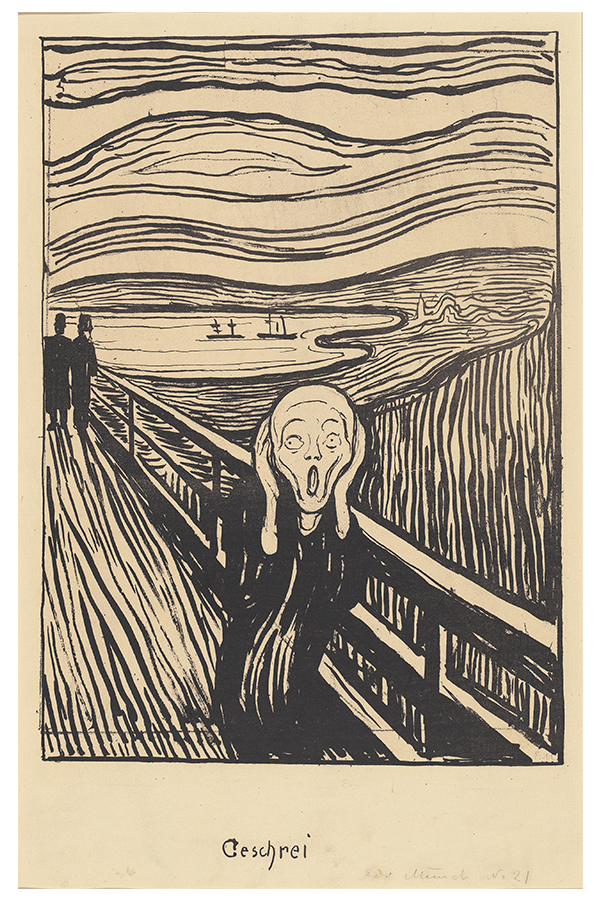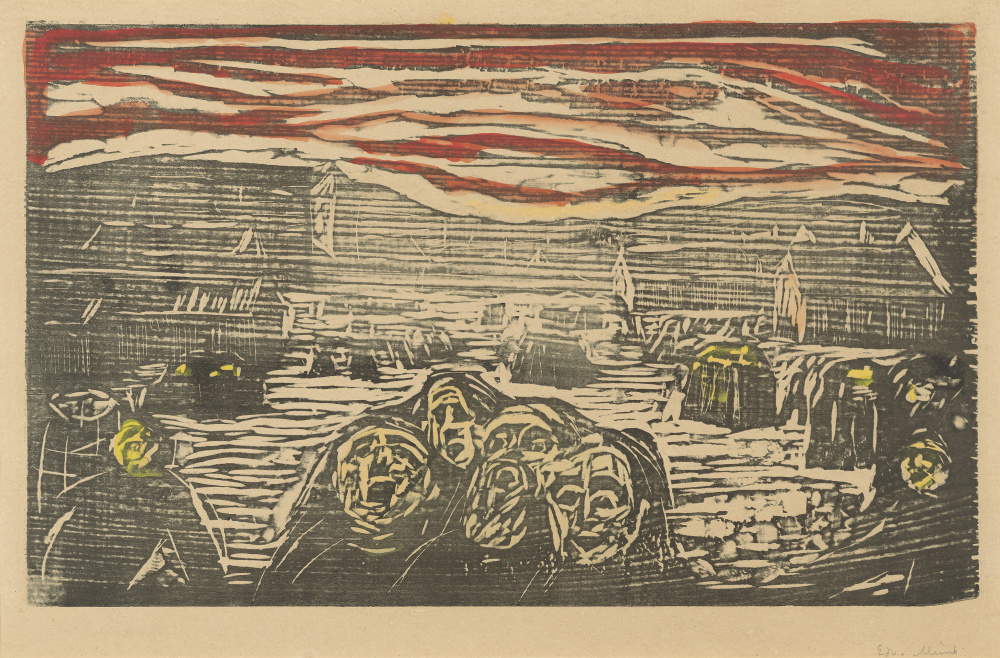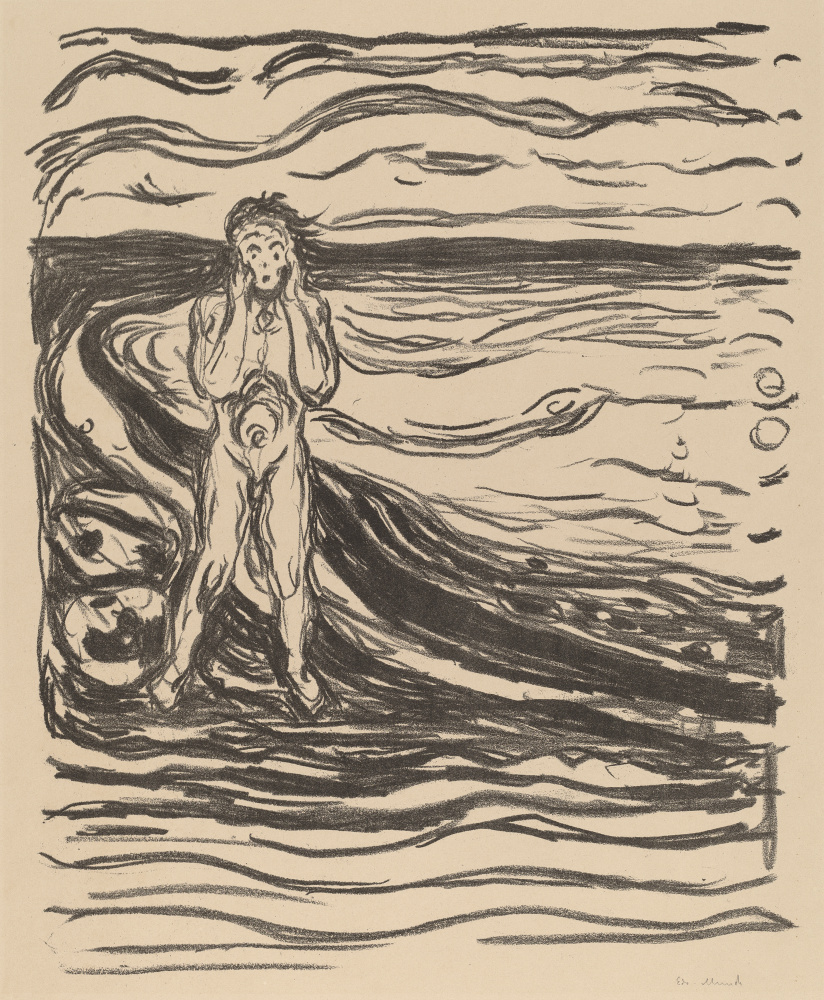- Open today, noon to 5 pm.
- Parking & Directions
- Free Admission
Mental Health Resources and Expert Response
Each year millions of Americans face the reality of living with a mental illness. The Museum’s spring exhibition, Edvard Munch and the Cycle of Life captures how pain and healing were a part of life for Munch, who suffered an unusual amount of early trauma and vulnerability.
Resources
National Suicide Prevention Lifeline,Hours: Available 24 hours. Languages: English, Spanish.
1-800-273-8255
NAMI (National Alliance on Mental Illness) Coastal Virginia has free support groups and classes for both the person with a mental health condition and their families and are now offering online support groups. www.namicoastalvirginia.org or call 757-499-2041 for support group days/times and class schedules.
I Need a Light House, a Depression and Suicide Education Awareness Program: www.ineedalighthouse.org or 757-567-5429
The Mentally Healthy Coalition is a group of health professionals, educators, city officials, nonprofit leaders, and others. Please visit talkaboutitnorfolk.com to learn more.
Response
On May 6, National Alliance on Mental Health Illness Coastal Virginia, The Chrysler Museum of Art and Hampton Roads Pride partnered to host Edvard Munch: Viewing Art through the Lens of Mental Health, a dialogue and discussion on art therapy led by Chrysler Museum Director Erik Neil. Panelists included Lloyd DeWitt, Irene Leache Curator of European Art and Chief Curator at the Chrysler Museum; Courtney Boone, Board President, National Alliance on Mental Health Illness Coastal Virginia; Cole Werkheiser, President, Hampton Roads Pride; Whitley Rogers, registered art therapist and licensed professional counselor; Todd Rosenlieb, Founder and Artistic Director for Todd Rosenlieb Dance and Chair of the Governor’s School for the Arts Dance Department; Jennifer Novotny, NAMI volunteer.
Below the video, read responses to the works of Edvard Munch from our community of mental health professionals.

Geschrei (The Scream), 1895
Lithograph
National Gallery of Art, Washington
Rosenwald Collection, 1943
Jen Williams, NAMI (National Alliance on Mental Illness) Coastal Virginia
Reflections on The Scream by Edvard Munch
So many of the images in the Munch exhibition reflect the feelings that people living with a mental health condition may experience. The Scream portrays the panic of being frightened and full of anxiety, and many people with mental illness will recognize the feelings of isolation, loneliness and despair in the face of the woman in the Peer Gynt lithograph. As Munch shows us, art can be an expression of one’s feelings, but can also provide a welcome release from the everyday challenge of viewing life through the lens of a mental illness.
With one in five people experiencing a mental health condition in their lifetime, it is important for family and friends to recognize and talk openly with their loved ones if they see them self-isolating, or displaying unusual sadness, despair, anxiety, anger, appetite and sleep changes, manic feelings or talk of being tired of living. Express your concern, and urge them to seek help. NAMI (National Alliance on Mental Illness) Coastal Virginia has free support groups and classes for both the person with a mental health condition and their families. We are now offering online support groups. Visit our website at www.namicoastalvirginia.org, or call our office at 757-499-2041 for support group days/times and class schedules.

Crowds in a Square, 1920
Color woodcut
National Gallery of Art, Washington, Gift of the Epstein Family Collection, 2013
Kay Ashby, NAMI (National Alliance on Mental Illness) Coastal Virginia
Reflections on Crowds in a Square by Edvard Munch
It’s as if Munch drew this today envisioning our towns and cities attacked by Covid19 which appears as a red cloud overhead. The sense of death and gruesome reaction to a terrible vision strikes me most.
But I also see Crowds in a Square created to show the horrors of someone suffering from paranoia who sees not a placid city square but rather a square filled with death and the community turned against him.
Kathleen Wakefield, MS Ed, Founder & Executive Director, I Need A Lighthouse, Inc.
Reflections on The Scream by Edvard Munch
I realize this is Munch’s most known piece. For myself and probably many others, it shows how close to the edge we are at some time or many times in our lives.
The refreshing and energizing aspect is even though we all at some time feel that way, either with good therapy or resources within us, we can and do move forward with life.
kwakefield@ineedalighthouse.org
757-567-5429
www.ineedalighthouse.org

Geschrei (The Scream), 1895
Lithograph
National Gallery of Art, Washington
Rosenwald Collection, 1943

Café Bauer, Berlin, 1902
Drypoint
National Gallery of Art, Washington, Rosenwald Collection, 1944
Elena Schexnider, NAMI (National Alliance on Mental Illness) Coastal Virginia
Reflections on Cafe Bauer, Berlin by Edvard Munch
Sometimes one can sit in a café where not a single chair is unoccupied and still feel alone. We must not forget, however, that while feeling lonely is a natural aspect of the human experience, we still need one another. We are ALL trying to navigate the roadmap of life. We must help each other along the way.

Alpha's Despair from Alpha and Omega, 1908–09
Lithograph in black
National Gallery of Art, Washington, The Epstein Family Collection, 2002
Reflections on Alpha’s Despair by Edvard Munch
We can only speculate the reason Alpha’s gaze is so melancholic. However, each of us can relate to the sentiment of fear or perhaps loss that characterizes different events of our lives. Just as the waves in the body of water next to Alpha ebb and flow, our lives are distinguished by ups and downs as well. Nothing is permanent and be assured that just when life may seem too heavy to bear, there is hope that this moment will pass and eventually bring solace.
I have provided links to the NAMI Online Support Groups, NAMI Coastal, as well as Covid-19 Resources.
https://www.namicoastalvirginia.org/online-support-groups
namicoastalvirginia.org
https://www.namicoastalvirginia.org/covid-19-resources
The Rev. John Rohrs, Mentally Healthy Norfolk Coalition
Reflections on Cafe Bauer, Berlin by Edvard Munch
In this striking exhibit, most of the subjects depicted in the prints are solitary, and many are in evident anguish. In contrast, this cafe scene seems ordinary and light-hearted by comparison. And yet a closer look at the faces in the print reveals nary a smile. They don’t even seem to be engaging with one another; heads are down, brows are furrowed, and each set of eyes looks past the other. I wonder if this perspective reflects Munch’s own struggle to relate with others and build community; or, perhaps, it is a window into the isolation he saw in the world around him, even in places and people who would seem to be drawn together at first glance.
To me, this print has much to say to our present moment. How often do we share a coffee or a meal with others at a cafe, only to look around and find everyone looking at their own phones? How often do we hide our own feelings of distress and isolation in public, putting on masks and pretending that all is well? Good mental health requires us to engage authentically with one another, to be willing to share our hurts and hopes, to look others in the eye and talk about our struggles. Perhaps one hard-earned grace that will emerge after this deadly coronavirus pandemic is that we all will be more ready to acknowledge our vulnerability. None of us is spared from the anxiety and fear of this moment, and we are finding solidarity and community in the midst of that realization. I pray that we might translate that solidarity into action on many fronts in the months ahead, including a commitment to reducing stigma and increasing access to mental health care in our city, state, and country.
The Mentally Healthy Coalition is a group of health professionals, educators, city officials, nonprofit leaders, and others. The coronavirus pandemic has postponed plans for our launch of Talk About It Norfolk, a campaign designed to help people access mental health care when and where they need it. Please visit our website to learn more – talkaboutitnorfolk.com – and stay tuned for a rescheduled launch in the months ahead.

Café Bauer, Berlin, 1902
Drypoint
National Gallery of Art, Washington, Rosenwald Collection, 1944

